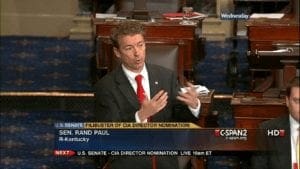Here’s Why Rand Paul’s “Filibuster” was Important
This article was featured in our weekly newsletter, the Liberator Online. To receive it in your inbox, sign up here.
The 10-hour marathon speech by Rand Paul, the freshman Kentucky Republican senator, may not technically be considered a filibuster, but it served an important purpose, nonetheless, as the upper chamber seeks to close out its business before going into a week-long Memorial Day recess.
The Senate was in the midst of a debate over the proposed Trade Promotion Authority on Wednesday when, at 1:18 PM, Paul rose from his desk and began speaking against the Patriot Act, executive overreach, and the National Security Agency.

This was Paul’s second filibuster, loosely speaking, since he took office. In February 2013, the Kentucky Republican, for nearly 13 hours, filibustered the nomination of John Brennan to serve as the director of the Central Intelligence Agency over the Obama administration’s use of drones to target American citizens.
“There comes to a time in the history of nations when fear and complacency allow power to accumulate and liberty and privacy to suffer. That time is now,” Paul declared on Wednesday. “And I will not let the Patriot Act, the most un-patriotic of acts, go unchallenged.”
What followed over the next several hours was nothing short of an eloquent defense of the Fourth Amendment, which protects Americans against unreasonable searches and seizures. Paul cited independent panels which have determined that the bulk collection of Americans’ phone metadata had not played a role in preventing acts of terrorism and analysis which found that the vast majority of surveillance requests relate to drug crimes, not terrorism.
Paul was joined by 10 of his colleagues, including Republican Senators Ted Cruz, Mike Lee, and Senator Ron Wyden and Joe Manchin, both of whom are Democrats.
Whether Paul’s latest marathon can be considered a filibuster is irrelevant. There was a method to his madness. Some, such as Reason’s Scott Shackford, have speculated that Paul and Wyden, both vigorous opponents of the Patriot Act, hope to include amendments to make the USA Freedom Act, which has already passed the House of Representatives, a stronger bill.
Paul did state that he plans to propose amendments to the bill, which is backed by Cruz and Lee, to ensure that the privacy of Americans is protected. But Wednesday’s speech may have served another purpose.
Section 215 of the Patriot Act is set to expire at the end of May, the Senate may not have enough time on the clock to pass what is expected to be a very close vote for reauthorization. Rather than the nearly six year extension of the Patriot Act that Senate Majority Leader Mitch McConnell, the senior senator from Kentucky, may be forced to settle for a short-term reauthorization to avoid sunset of the controversial provision. Paul, who opposes the USA Freedom Act without stronger provisions, would prefer to run out the clock on the provision, letting it expire.
The situation is fluid because McConnell has floated keeping the Senate in session through the Memorial Day weekend to strong-arm reauthorization, but most observers have speculated that there are not the votes to bypass a filibuster, with many members of both parties expressing a desire for reform.
Whether Section 215 survives is fluid at the moment, but Paul’s speech has already had a huge impact. The Department of Justice issued a statement on the status of the NSA’s illegal surveillance program.
“After May 22, 2015,” the release said as reported by the Associated Press, “the National Security Agency will need to begin taking steps to wind down the bulk telephone metadata program in anticipation of a possible sunset in order to ensure that it does not engage in any unauthorized collection or use of the metadata.”
It may be too early to declare victory, but it’s certainly within reach.

























